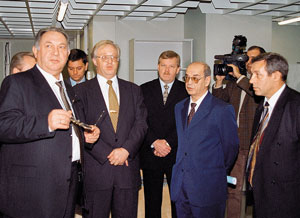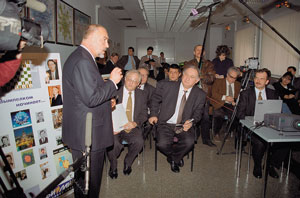This time Sviazinvest blocked our way. Nemtsov’s office was calling, asking us to lock the addenda to the licenses in the safe and to show them to no one. Krupnov was calling, asking for the documents back.
This latest misfortune could not have come about without help from our old acquaintance Leonid Rozhetskin. While working for Potanin, he proposed that the Governmental Decree on the sale of the second packet of Sviazinvest shares contain a clause, fatal for us, granting it a global (over the entire RF territory) GSM license, supplemented by a permit to use the rest of the frequency band. All this was meant to raise the Sviazinvest share price.
Leonid told me once that he first got the idea to start his own cellular business after he was introduced to VympelCom. He realized his plan in the end, but not at the time of these events. At that time I wanted to tear him to pieces. Later we became friends again, and then… but this I will tell you later – if I’m lucky.
In vain I ran all over town, trying to convince various people of the wrong-headedness of this idea. How is it possible to take an inefficient company (Sviazinvest), ripe for a serious re-organization, and award it a completely new and unfamiliar business, while also encouraging the establishment of a monopoly?! You could connect Sviazinvest with an already efficiently functioning manufacturing plant, but not state documentation for a non-existent business, which would also harm the market.
It was all in vain… And Leonid Rozhetskin in a friendly way clarified for me that my fears of a cellular license getting into the hands of the inefficient Sviazinvest management were unjustified. It won’t get in their hands; their management wouldn’t come anywhere close to that license. To realize it, an entirely new company would be created, and one of the largest Western carriers be invited in as an investor. Or, the new company could simply be sold along with the license.
I spoke about this with Vladimir Potanin as well. He also was extremely amiable, inviting me to invest in the abovementioned newly conceived company. That is, he was offering me on honest market terms to become one of the investors in a grave-digger for VympelCom .
That was it: it was time to prepare a wake for VympelCom…
And all of a sudden… we had to default.
We had suffered tremendous losses, but the question of privatization of Sviazinvest was buried for a long time to come.
There was no funeral certificate, however, and Krupnov was in no hurry to revoke his ban.
I met with Alexander Yevgenyevich Krupnov by the metro on Khoroshovskoye Highway at the end of May of 1999. Sasha had resigned a few hours earlier. He had previously signed the letter that you can see in the Appendix. The letter disavowed the prohibition cited above. Nine months later! The letter described our great labor achievements in the nine months. In spite of the prohibition. But all that time the company existed with meager legal rights. Our thanks go out to the sympathetic and even helpful bureaucrats that still existed back then. Otherwise we would have had a very, very hard time.
We kissed each other good-bye. And when we see each other now, which happens quite often, we hug. But I’m getting ahead of myself in this paragraph. We still had to live long enough to reach this blissful ending.
On August 23 the Kiriyenko government was forced to resign. Primakov was appointed as the new premier, and Nemtsov’s office was now occupied by Yuri Dmitriyevich Masliukov.
I had seen Y. D. Masliukov once, back in the Soviet time. He was on the podium, and held the post of head of the Military Industrial Complex, one of the highest in the Soviet hierarchy. But now he amiably agreed to see me on the second or third day (!) of assuming his new post of vice-premier of the RF. I left his office charmed by his benevolence and his interest in coming to see our company. Such a visit was very useful for our image and our market value. Yuri Dmitriyevich noted that it was the government’s duty to boost the image and capitalization of Russian companies. Even more so if it was only a matter of paying a visit. But also he was interested himself.
 I’m not a big fan of Communists, but Masliukov was a rather pleasant exception. Only a few days later, he indeed came to see us on Ulitsa of 8th of March. (When will they finally change this idiotic name?)
I’m not a big fan of Communists, but Masliukov was a rather pleasant exception. Only a few days later, he indeed came to see us on Ulitsa of 8th of March. (When will they finally change this idiotic name?)
In the photos next to him is the deputy of the Communications Minister, Naum Semyonovich Marder, whose portrait I was offering to VympelCom fans to venerate. And the one making a report is the financial analyst Vladimir Timofeevich Bitutskikh, famous at VympelCom. Otherwise, Vladimir Timofeevich has a PhD in Math and Physics, or maybe in Technology – I can’t remember now, so much time has passed. And it’s beyond the point;  what is important is that it was one of the mighty brains of the scientific and production entity that was Vympel, which in Soviet times was involved in solving the problem of an anti-missile defense against the USA, as well as possible annihilation of the said U.S.A. Vladimir Timofeevich had solved the first part of this national problem, and then the country ran out of money, and V.T. Bitiutskikh, after tightening his belt for a few months, came to the newly created VympelCom. Thus were solved a trio of problems: USA was saved form destruction, Bitiutskikh was saved from starvation, and VympelCom received one of the wisest analysts in the country.
what is important is that it was one of the mighty brains of the scientific and production entity that was Vympel, which in Soviet times was involved in solving the problem of an anti-missile defense against the USA, as well as possible annihilation of the said U.S.A. Vladimir Timofeevich had solved the first part of this national problem, and then the country ran out of money, and V.T. Bitiutskikh, after tightening his belt for a few months, came to the newly created VympelCom. Thus were solved a trio of problems: USA was saved form destruction, Bitiutskikh was saved from starvation, and VympelCom received one of the wisest analysts in the country.
And now in RTI’s (which is part of Vympel) former warehouse, one of the former theoreticians of Soviet “Star Wars” is reporting to the former head of the Military Industrial Complex of the former USSR on the dynamics of VympelCom’s financial indicators and on ways to increase the company’s capitalization at the New York Stock Exchange.
All of the above, however, is child’s play compared to the importance for the future of the company of another great document, which Yuri Dmitriyevich signed when I was in his office.
Here is the document. At first glance it is modest, and seems to only cover the simple matter of verifying the terms of payments (in the event of default) by VympelCom to the Space Agency for the frequencies.
But note the little line in the end of the page: “All other articles of the Decree remain unchanged.” This means that not only the government of Kiriyenko-Nemtsov, but also that of Primakov-Masliukov had signed off on the decree over our access to GSM-900. That was the whole point of our plan.
On October 22, 1998, VympelCom announced the launch of its 900 MHz base stations in Moscow, and the start of a two-band network, just like the one at the disposal of our rival. You wouldn’t believe the outcry! The media whipped up such a campaign, with the prosecutor’s office and parliamentary members pitching in. What an attack was launched against the decision by Nemtsov-Marder! It was funny to realize that some of the Duma members – signatories of clever exhortations on cellular standards, had trouble telling a kilohertz from a kilogram.
I will skip here what was going on in the media. Excerpts from some publications and documents you can find in the Appendix. [page 4] No comment, all is clear as day.
Masliukov’s signature was an armor plate in our defense against this massive attack.
And so, another company offering the European GSM standard appeared on the Moscow market of cellular services. Thus, conditions for real competition were created, and soon spread all over the country. This in turn led to record rates of market development for cellular communications in our country.
And one more memory of general nature.
No matter how nasty an event in the history of our company, it ultimately had the potential for a huge positive effect.
Indeed, let’s take the default, which put the company on the verge of financial catastrophe. At the same time, if not for the default, we wouldn’t have had the addenda to our licenses which then allowed us to conduct business in GSM-900 (see the chapter on the GSM crisis). And then VympelCom would have followed in the steps of MSS, and over time would have dwindled away.
Or let’s take the case of AFK System’s lobbying for changing the licensing policies at the Communications Ministry, and winning access to GSM-1800 for its companies, which for us was a death threat.
Incidentally, both then, and for a few years thereafter, GSM-1800 was absolutely of no use to them.
Back then I was begging Goncharuk, Yevtushenkov and Bulgak not to do that, not to destroy the market. Now I’m grateful to them for not listening to me.
If not for that, we would have had absolutely no reason to compete for access to GSM-900. The modern-day VymeplCom would not exist.
I could have continued the list of these episodes.



